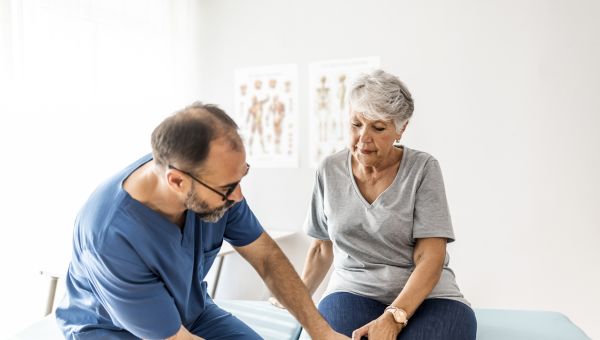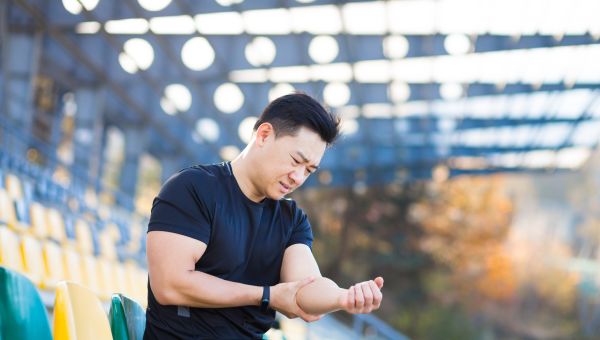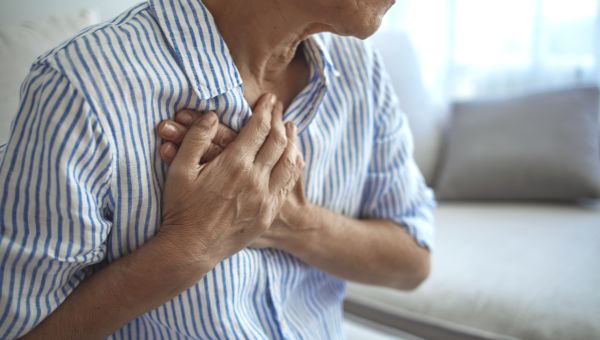Get to know rheumatoid arthritis
Learn about the risk factors, symptoms, and treatments for this autoimmune condition.
Updated on August 4, 2022

Rheumatoid arthritis (RA) is an autoimmune disease that causes pain, swelling, and stiffness in the joints. While RA can attack joints throughout the body, it is most common in the hands, wrists, elbows, feet, ankles, and knees. Left untreated, it can damage cartilage and bones, causing joints to become damaged or misshapen. Since joint damage cannot be reversed, it’s… Show More
Rheumatoid arthritis (RA) is an autoimmune disease that causes pain, swelling, and stiffness in the joints. While RA can attack joints throughout the body, it is most common in the hands, wrists, elbows, feet, ankles, and knees. Left untreated, it can damage cartilage and bones, causing joints to become damaged or misshapen. Since joint damage cannot be reversed, it’s important to get diagnosed and treated as soon as you notice the first signs and symptoms of the disease.
Show Less
Who Has RA?
According to the Arthritis Foundation, 1.5 million Americans are currently living with rheumatoid arthritis. The disease is two to three times more common in women than in men. It often begins in women between ages 30 and 60, whereas men are more likely to be diagnosed later in life. Teenagers and… Show More
According to the Arthritis Foundation, 1.5 million Americans are currently living with rheumatoid arthritis. The disease is two to three times more common in women than in men. It often begins in women between ages 30 and 60, whereas men are more likely to be diagnosed later in life. Teenagers and young adults also can develop RA.
Show Less
Are You at Risk?
While scientists cannot pinpoint an exact cause of the disease, there are certain factors—in addition to age and sex—that may increase RA risk.
Family history: Genetics may predispose you to RA, but most people diagnosed have no family history of the disease.
Smoking: Lighting up can raise odds… Show More
While scientists cannot pinpoint an exact cause of the disease, there are certain factors—in addition to age and sex—that may increase RA risk.
Family history: Genetics may predispose you to RA, but most people diagnosed have no family history of the disease.
Smoking: Lighting up can raise odds risk of RA and worsen symptoms if you’ve already been diagnosed.
Environment: Many experts believe that some infections or environmental factors may trigger the disease. Several factors have been studied—Epstein-Barr virus, stress, and insecticides are a few—but none have yet been confirmed.
Obesity: People who are obese, meaning they have a body mass index of at least 30, may be more likely to develop RA.
Show Less
Rheumatoid Arthritis Symptoms
Symptoms include joint pain, tenderness, and stiffness. The stiffness may last 30 minutes or longer after you wake up or sit for a long time. The joints may be warm, red, and swollen. People may also have other symptoms, such as fatigue, a low-grade fever, and weight loss.
Rheumatoid arthritis… Show More
Symptoms include joint pain, tenderness, and stiffness. The stiffness may last 30 minutes or longer after you wake up or sit for a long time. The joints may be warm, red, and swollen. People may also have other symptoms, such as fatigue, a low-grade fever, and weight loss.
Rheumatoid arthritis usually affects the smaller joints first, and spreads to larger ones as it progresses. For example, the disease may start in the fingers and wrists, then spread to the elbows and shoulders. In most cases, symptoms occur in the same joints on both sides of your body.
RA symptoms vary in intensity and may come and go, but flare-ups can last for days or even months.
Show Less
Complications of RA
Some people with RA experience complications in places other than their joints, such as:
Osteoporosis. RA and steroids can up the risk of osteoporosis, a condition where bones are more fragile and prone to breaks.
Anemia. RA inflammation, as well as some RA meds, may cause anemia, a decrease in red… Show More
Some people with RA experience complications in places other than their joints, such as:
Osteoporosis. RA and steroids can up the risk of osteoporosis, a condition where bones are more fragile and prone to breaks.
Anemia. RA inflammation, as well as some RA meds, may cause anemia, a decrease in red blood cell count.
Heart disease. Those with RA have a 50 to 70 percent increased risk of heart disease compared to the general population, according to the Arthritis Foundation.
Lung issues. Outside of joint problems, lung conditions are the most common health troubles tied to RA. Complications include small lung growths called pulmonary nodules, as well as interstitial lung disease, which scars lung tissue and can make it tough to breathe.
Other complications include neck pain, dry eyes and mouth, and inflammation of the blood vessels or the sac around the heart. Your best defense against RA complications is to get early treatment.
Show Less
Getting a Diagnosis
Researchers believe that RA causes bone damage as early as the first or second year of the disease, which is why early diagnosis is important. If you’re experiencing signs and symptoms of RA, your healthcare provider may refer you to a rheumatologist. A doctor who specializes in musculoskeletal and… Show More
Researchers believe that RA causes bone damage as early as the first or second year of the disease, which is why early diagnosis is important. If you’re experiencing signs and symptoms of RA, your healthcare provider may refer you to a rheumatologist. A doctor who specializes in musculoskeletal and autoimmune diseases, your rheumatologist will take your medical history and examine your joints, looking out for tenderness, redness, swelling, and painful or limited movement.
Blood tests alone cannot diagnose RA, but they can measure inflammation levels and look for certain markers linked to the disease. Your rheumatologist may also order imaging tests such as an X-ray, ultrasound, or magnetic resonance imaging scan to check for joint damage and track the progress of the disease.
Show Less
Treating Rheumatoid Arthritis
There is no cure for RA, so the goal of treatment is to relieve symptoms, decrease inflammation, and prevent further joint damage. Nonsteroidal anti-inflammatory drugs (NSAIDs) such as ibuprofen may ease pain and inflammation. Doctors sometimes prescribe short-term use of low-dose corticosteroids… Show More
There is no cure for RA, so the goal of treatment is to relieve symptoms, decrease inflammation, and prevent further joint damage. Nonsteroidal anti-inflammatory drugs (NSAIDs) such as ibuprofen may ease pain and inflammation. Doctors sometimes prescribe short-term use of low-dose corticosteroids to reduce inflammation quickly. Disease-modifying antirheumatic drugs (DMARDS), which include biologics and janus kinase (JAK) inhibitors, are an important part of treatment, because they slow the course of the disease. However, if RA has caused permanent damage, your doctor may suggest joint replacement surgery.
Show Less
Living with Rheumatoid Arthritis
Rheumatoid arthritis isn’t just about chronic pain. People with RA know that it can affect every aspect of their lives. The disease may cause depression, anxiety, feelings of helplessness, and low self-esteem, among other emotional and mental health difficulties. Take care of your RA—and yourself—… Show More
Rheumatoid arthritis isn’t just about chronic pain. People with RA know that it can affect every aspect of their lives. The disease may cause depression, anxiety, feelings of helplessness, and low self-esteem, among other emotional and mental health difficulties. Take care of your RA—and yourself—through:
Exercise: A little movement can soothe sore joints and boost energy levels. Experts often recommend low-impact exercises like walking or swimming.
Complementary therapies: Some people find that practices such as acupuncture and massage help to relieve their pain and stiffness. Ask your provider if these therapies are right for you, and make sure any practitioner has experience dealing with RA.
Thermotherapy: Rheumatologists may recommend cold packs to treat acute RA flare-ups and heat to ease stiffness.
Healthy eating: While no specific diet has been found to improve RA symptoms, eating lots of wholesome, nutritious foods may reduce inflammation and help you feel better. In general, try to emphasize produce, lean proteins, and heathy fats, and cut back on added sugar and saturated fat.
Friends: Surround yourself with loved ones to help keep your mind off the pain and help you with daily activities.
Show Less
NIH: National Institute of Arthritis and Musculoskeletal and Skin Diseases. Rheumatoid Arthritis. Last reviewed September 2019.
Arthritis Foundation. Rheumatoid Arthritis: Causes, Symptoms, Treatments and More. Updated Oct. 15, 2021.
Cleveland Clinic. Rheumatoid Arthritis. February 18, 2022.
Centers for Disease Control and Prevention. Arthritis: Rheumatoid Arthritis (RA). Last reviewed July 27, 2020.
Arthritis Foundation. Arthritis and Heart Disease. Updated Feb. 11, 2022.
Susan Bernstein and Mary Anne Dunkin. Arthritis Foundation. Benefits of Massage. Accessed August 2, 2022.
Arthritis Foundation. Acupuncture for Arthritis. Accessed August 2, 2022.
Arthritis Foundation. Heat Therapy Helps Relax Stiff Joints. Accessed August 2, 2022.
Romão VC, Fonseca JE. Etiology and Risk Factors for Rheumatoid Arthritis: A State-of-the-Art Review. Front Med (Lausanne). 2021 Nov 26;8:689698.
Arthritis Foundation. How Long Does a Flare Last? Accessed August 4, 2022.
National Health Service Oxford University Hospitals. FAQ About Managing a Flare of Inflammatory Arthritis. Last Reviewed December 2, 2021.
Mayo Clinic. Rheumatoid Arthritis. May 18, 2021.
Arthritis Foundation. Treatments for Rheumatoid Arthritis. Accessed August 4, 2022.
Arthritis Foundation. What You Need to Know About RA and Lung Disease. Accessed August 4, 2022.
American Lung Association. Interstitial Lung Disease (ILD). Accessed August 4, 2022.
More On


video

article

slideshow


video


video
